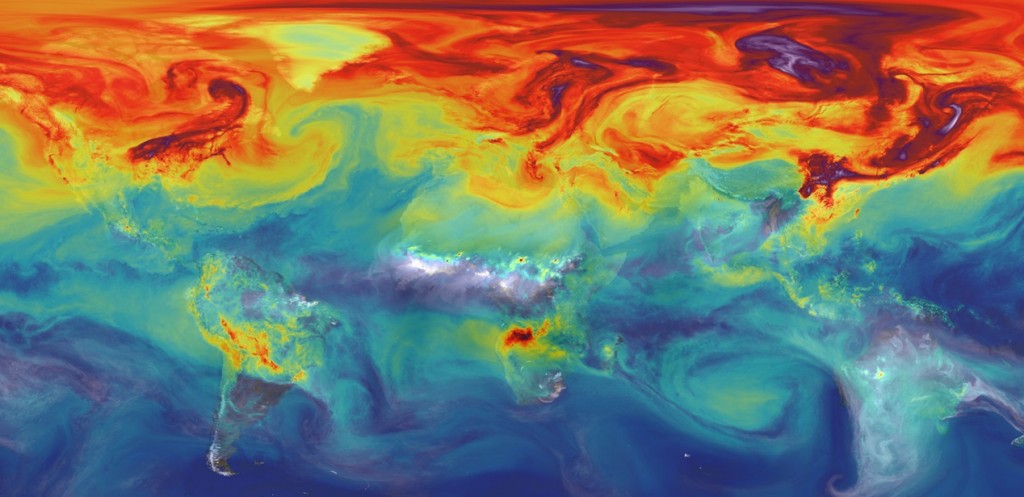Sometime in the past two years the Left got a notion that the best way to win the debate over climate change was to declare anyone who disagreed with the received wisdom that the planet was steadily warming was to send them to prison. Last year I wrote about the idiotic view of Sen. Sheldon Whitehouse that climate skeptics were somehow “racketeers.”
But the Left keeps sinking deeper into the mire of speech banning. The Daily Caller’s Michael Bastasch reports that a clause of this year’s Democratic Party platform is calling for energy companies “who have repeatedly misled shareholders and the public on the possibility of climate change” to be prosecuted “for alleged corporate fraud.”
Earlier this year, Attorney General of the Virgin Islands Claude Walker demanded that the Competitive Enterprise Institute[1] (CEI) turn over ten years (from 1997-2007) of communications between the organization and ExxonMobil. In May, Walker withdrew his request, but announced that it could be reinstated any time for any reason.
You would think this would be the end of the matter, but Yale Law School Dean Robert Post wrote an opinion piece for the Washington Post defending the effort to prosecute climate skeptics. Dean Post’s fatuous arguments deserve to be vigorously rebuked.
According to the dean, the lawsuits are corporate fraud cases that have nothing to do with the First Amendment, “if large oil companies have deliberately misinformed investors about their knowledge of global warming, they may have seriously committed commercial fraud.”
He makes a comparison between the tobacco companies and cancer and the oil companies and global warming. The comparison is specious. The sentence “smoking cigarettes substantially increases the likelihood you will get lung cancer” is factually accurate because epidemiologists have spent decades making the connection between cigarettes and cancer.
The statement “global temperatures will rise by two degrees Celsius over the next 50 years” is a prediction. It is an opinion based on forecasts provided by models. The evidence is that the average temperature of the earth has not risen since 1998 and that many models in the past made predictions of future global temperatures that were substantially overstated. Moreover, before 1980 many eminent scientists confidentially forecast that the Earth was entering an ice age.[2] Were those scientists committing fraud?
If Dean Post is going to say that opinions are fraudulent, we should know what constitutes fraud. If I say that the earth will only warm by one degree in 50 years—the position of Matt Ridley, Bjorn Lomborg, and me—am I committing “fraud?” What about half a degree? Or six degrees?
He then says, “ExxonMobil and its supporters are now eliding the difference between fraud and public debate.” But, as he knows, ExxonMobil stopped funding the Competitive Enterprise Institute in 2006. Go to the heavy-breathing exxonsecrets.org and you will not find any contributions made by ExxonMobil to CEI after 2005. That’s one reason why General Walker’s request doesn’t ask for any emails after 2007. Even if you don’t like CEI, you can’t claim that Big Oil in any way controls the organization.
“One would think conservative intellectuals would be the first to recognize the necessity of prohibiting fraud so as to ensure the integrity of free markets,” Dean Post declares. But he never says what, exactly, ExxonMobil said that was “fraudulent”—unless he is saying that any statement by ExxonMobil on climate change is fraudulent. Wouldn’t that be a violation of ExxonMobil’s First Amendment rights?
Bloomberg columnist Megan McArdle raises an important point. “What exactly would the subpoena prove? That ExxonMobil supported opinions about climate change? That the opinions tended to be congruent with its own interests? That this opinion might have been wrong, and if so, might have encouraged wrong beliefs in others? This is a description of, roughly, every person or organization in the history of the world, not excluding attorneys general. It’s also not illegal…This isn’t preventing consumers from buying into a Ponzi scheme; it’s an attempt to criminalize advocacy.”
It should also be noted that it isn’t just “conservative intellectuals” worried about prosecutorial overreach by attorneys general on climate change. The Washington Post wrote an editorial last November critiquing an effort by New York State Attorney General Eric Schneiderman to prosecute ExxonMobil for its views on climate change on the grounds that the company violated securities law.
“There’s also a risk whenever law enforcement holds the prospect of criminal penalties for those involved in a scientific debate,” the Post editorialized. “Legitimate scientific inquiry depends on allowing strong, even unfair criticism of the claims that scientists make. As the Exxon investigations show, respecting that principle will not lead to positive outcomes in all cases. But it nevertheless demands that the government have a sizable buffer zone between irresponsible claims and claims it believes may be criminally fraudulent.”
Finally, a word to environmentalists. If the evidence you have supporting climate change is so persuasive, why is it necessary to prosecute those who disagree with your opinions? Do the prosecutions and legal harassment of groups like the Competitive Enterprise Institute show the strength of your position—or the weakness of it?
[1] I have written one paper for the Competitive Enterprise Institute.
[2] Did you know that Betty Friedan in 1958 wrote an article for Harper’s Magazine predicting the forthcoming ice age? Well, she did.






